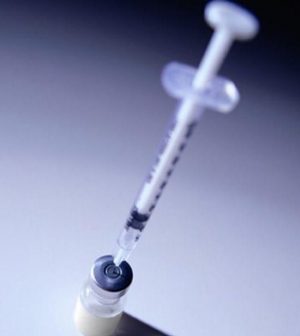- Recognizing the Signs of Hypothyroidism
- 10 Strategies to Overcome Insomnia
- Could Artificial Sweeteners Be Aging the Brain Faster?
- Techniques for Soothing Your Nervous System
- Does the Water in Your House Smell Funny? Here’s Why
- Can a Daily Dose of Apple Cider Vinegar Actually Aid Weight Loss?
- 6 Health Beverages That Can Actually Spike Your Blood Sugar
- Treatment Options for Social Anxiety Disorder
- Understanding the Connection Between Anxiety and Depression
- How Daily Prunes Can Influence Cholesterol and Inflammation
Study Gives Hope for ‘Dream’ Vaccine Against All COVID Variants

A multi-purpose vaccine that would protect humans against any future COVID-19 variants could one day be possible, a new study suggests.
The key to it all lies in a coronavirus scare that happened nearly two decades ago.
People previously infected with SARS — the original coronavirus pandemic from 2003 — produced an incredibly powerful immune response when given the Pfizer COVID-19 vaccine nearly 20 years later, researchers report.
Even better, the antibodies they produced were effective against all known COVID-19 variants, as well as animal coronaviruses that could one day make the leap into humans.
“Our study points to a novel strategy for the development of next-generation vaccines, which will not only help us control the current COVID-19 pandemic, but may also prevent or reduce the risk of future pandemics caused by related viruses,” said senior researcher Lin-Fa Wang, of Duke-NUS Medical School’s Emerging Infectious Diseases Program in Singapore.
For the study, Wang and his team compared the immune response that the Pfizer vaccine produced in three different groups of people — eight SARS survivors, 10 healthy people, and 10 people who survived COVID-19 infection.
SARS was first reported in Asia in 2003. The coronavirus that causes it — SARS-CoV-1 — spread to more than two dozen countries across four continents before the global outbreak was contained.
Researchers suspected that previous infection with SARS might create a different immune response from the Pfizer vaccine, which inoculates people against SARS-CoV-2 — the COVID-19 coronavirus.
It turned out the SARS survivors showed the most powerful immune response of the three groups. They were the only ones who produced antibodies protective against a group of 10 different coronaviruses that included COVID-19 variants and animal coronaviruses.
The findings were published Aug. 19 in the New England Journal of Medicine.
Two infectious disease experts not related to the study said the research appears promising.
“They produced very broad spectrum and high-level neutralizing antibodies against a really broad range of coronaviruses, which is interesting and impressive,” said Dr. Greg Poland, founder of the Mayo Clinic’s Vaccine Research Group.
The study shows that vaccines can work with infections to produce powerful protection, said Dr. Amesh Adalja, a senior scholar with the Johns Hopkins Center for Health Security in Baltimore.
“The study reflects that immunity builds upon immunity, and that immunity induced by vaccine and natural infection synergistically work together to give people very robust immunity, not just against COVID-19 but other coronaviruses as well,” Adalja said.
All of the coronaviruses considered in this study rely on a common enzyme called ACE-2 to enter human cells, Wang and the researchers said. Those include SARS, COVID-19 and the animal coronaviruses.
Vaccines aimed at blocking that enzyme during viral infections could potentially protect against any new COVID-19 variants, as well as any future coronaviruses, the researchers speculated.
“It’s kind of the holy grail, immunologically — the idea that you could develop a vaccine that would include enough of the antigens to cover a broad range of multiple coronaviruses,” Poland said, comparing this to the ongoing search for a universal flu vaccine.
However, Poland warned that this was a small study, and the notion will need much more research before it can produce a new vaccine.
“Now they’re going to have to prove it,” Poland said. “I would call it a proof-of-concept study.”
More information
The U.S. Centers for Disease Control and Prevention has more about SARS.
SOURCES: Greg Poland, MD, founder, Mayo Clinic’s Vaccine Research Group; Amesh Adalja, MD, senior scholar, Johns Hopkins Center for Health Security, Baltimore; New England Journal of Medicine, Aug. 19, 2021
Source: HealthDay
Copyright © 2026 HealthDay. All rights reserved.










